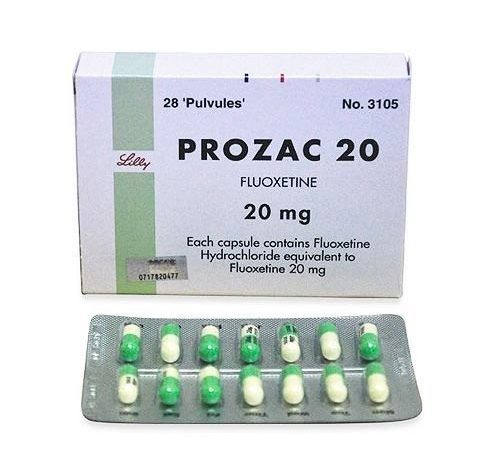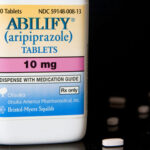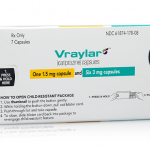Fluoxetine (Prozac): Uses, Benefits, How it works, Side Effects

What Is Fluoxetine And What Does It Treat?
Fluoxetine (Prozac) is used to treat depression, obsessive-compulsive disorder (bothersome thoughts that won’t go away and the need to perform certain actions over and over), some eating disorders, and panic attacks (sudden, unexpected attacks of extreme fear and worry about these attacks).
Fluoxetine (Sarafem) is used to relieve the symptoms of premenstrual dysphoric disorder, including mood swings, irritability, bloating, and breast tenderness. It is also used along with olanzapine (Zyprexa) to treat depression that did not respond to other medications and episodes of depression in people with bipolar I disorder (manic-depressive disorder; a disease that causes episodes of depression, episodes of mania, and other abnormal moods).
Fluoxetine may also be helpful when prescribed “off-label” for body dysmorphic disorder, binge eating disorder, generalized anxiety disorder (GAD), social phobia (also known as social anxiety disorder), dysthymia, or posttraumatic stress disorder (PTSD). “Off-label” means that it hasn’t been approved by the Food and Drug Administration for this condition. Your mental health provider should justify his or her thinking in recommending an “off-label” treatment. They should be clear about the limits of the research around that medication and if there are any other options.
How Fluoxetine (Prozac) works
Fluoxetine (Prozac) is in a class of medications called selective serotonin reuptake inhibitors (SSRIs). It works by increasing the amount of serotonin, a natural substance in the brain that helps maintain mental balance.
What Is The Most Important Information I Should Know About Fluoxetine (Prozac)?
Do not stop taking fluoxetine, even when you feel better. With input from you, your health care provider will assess how long you will need to take the medicine.
Missing doses of fluoxetine may increase your risk for relapse in your symptoms.
Stopping fluoxetine abruptly may result in one or more of the following withdrawal symptoms: irritability, nausea, dizziness, vomiting, nightmares, headache, and/or paresthesias (prickling, tingling sensation on the skin).
Depression is also a part of bipolar illness. People with bipolar disorder who take antidepressants may be at risk for “switching” from depression into mania. Symptoms of mania include “high” or irritable mood, very high self-esteem, decreased need for sleep, pressure to keep talking, racing thoughts, being easily distracted, frequently involved in activities with a large risk for bad consequences (for example, excessive buying sprees).
Medical attention should be sought if serotonin syndrome is suspected. Please refer to serious side effects for signs/symptoms.
What Should I Discuss With My Health Care Provider Before Taking Fluoxetine (Prozac)?
• Symptoms of your condition that bother you the most
• If you have thoughts of suicide or harming yourself
• Medications you have taken in the past for your condition, whether they were effective or caused any adverse effects
• If you experience side effects from your medications, discuss them with your provider. Some side effects may pass with time, but others may require changes in the medication.
• Any other psychiatric or medical problems you have, including a history of bipolar disorder
• All other medications you are currently taking (including over the counter products, herbal and nutritional supplements) and any medication allergies you have
• Other non-medication treatments you are receiving, such as talk therapy or substance abuse treatment. Your provider can explain how these different treatments work with the medication.
• If you are pregnant, plan to become pregnant, or are breastfeeding
• If you drink alcohol or use drugs
How Should I Take Fluoxetine (Prozac)?
Fluoxetine (Prozac) is usually taken one time per day with or without food.
Typically, patients begin at a low dose of medicine and the dose is increased slowly over several weeks.
The dose usually ranges from 20 mg to 80 mg when taken once daily or 90 mg taken once weekly. Only your health care provider can determine the correct dose for you.
If you are taking fluoxetine for PMDD, it can be taken once daily (every day) or intermittently (usually starting 14 days prior to menstruation through the first full day of menses of each cycle). Discuss this with your prescriber.
The liquid should be measured with a dosing spoon or oral syringe which you can get from your pharmacy.
The delayed-release form should be swallowed whole. It should not be chewed, crushed, or broken.
Consider using a calendar, pillbox, alarm clock, or cell phone alert to help you remember to take your medication. You may also ask a family member or friend to remind you or check in with you to be sure you are taking your medication.
What Happens If I Miss A Dose Of Fluoxetine (Prozac)?
If you miss a dose of fluoxetine that you take daily, take it as soon as you remember, unless it is closer to the time of your next dose. If you take fluoxetine once weekly, take it as soon as possible, then go back to your regular schedule next week. Discuss this with your health care provider. Do not double your next dose or take more than what is prescribed.
What Should I Avoid While Taking Fluoxetine (Prozac)?
Avoid drinking alcohol or using illegal drugs while you are taking antidepressant medications. They may decrease the benefits (e.g., worsen your condition) and increase adverse effects (e.g., sedation) of the medication.
What Happens If I Overdose With Fluoxetine (Prozac)?
If an overdose occurs, call your doctor or 911. You may need urgent medical care. You may also contact the poison control center at 1-800-222-1222. A specific treatment to reverse the effects of fluoxetine does not exist.
How Long Does It Take For Fluoxetine (Prozac) To Work?
Sleep, energy, or appetite may show some improvement within the first 1-2 weeks. Improvement in these physical symptoms can be an important early signal that the medication is working. Depressed mood and lack of interest in activities may need up to 6-8 weeks to fully improve.
Can a pregnant woman take Fluoxetine (Prozac)?
If you are planning on becoming pregnant, notify your health care provider to best manage your medications. People living with MDD who wish to become pregnant face important decisions. Untreated MDD has risks to the fetus, as well as the mother. It is important to discuss the risks and benefits of treatment with your doctor and caregivers. For women who take antidepressant medications during weeks 13 through the end of their pregnancy (second and third trimesters), there is a risk that the baby can be born before it is fully developed (before 37 weeks).
For mothers who have taken SSRIs during their pregnancy, there appears to be less than a 1% chance of infants developing persistent pulmonary hypertension. This is a potentially fatal condition that is associated with the use of the antidepressant in the second half of pregnancy. However, women who discontinued antidepressant therapy were five times more likely to have a depression relapse than those who continued their antidepressant. If you are pregnant, please discuss the risks and benefits of antidepressant use with your health care provider.
Can a breastfeeding woman take Fluoxetine (Prozac)?
Caution is advised with breastfeeding since fluoxetine does pass into breast milk. If your doctor or healthcare provider says your baby is healthy, fluoxetine can be used during breastfeeding. It has been used in many breastfeeding mothers without any problems. Fluoxetine passes into breast milk, usually in small amounts.
What Are The Possible Side Effects Of Fluoxetine (Prozac)?
Fluoxetine (Prozac) may cause side effects. Tell your doctor if any of these symptoms are severe or do not go away:
• anxiety
• changes in sex drive or ability
• diarrhea
• difficulty falling asleep or staying asleep
• dry mouth
• excessive sweating
• headache, confusion, weakness, difficulty concentrating, or memory problems
• heartburn
• loss of appetite
• nausea
• nervousness
• uncontrollable shaking of a part of the body
• weakness
• weight loss
• yawning
Some side effects can be serious. If you experience any of the following symptoms, call your doctor immediately:
• abnormal bleeding or bruising
• agitation, fever, sweating, confusion, fast or irregular heartbeat, shivering, severe muscle stiffness or twitching, hallucinations, loss of coordination, nausea, vomiting, or diarrhea
• difficulty breathing or swallowing
• dizziness or fainting
• fast, slow, or irregular heartbeat
• fever
• hives or blisters
• itching
• joint pain
• rash
• seizures
• shortness of breath
• swelling of the face, throat, tongue, lips, eyes, hands, feet, ankles, or lower legs
Fluoxetine (Prozac) may decrease appetite and cause weight loss in children. Your child’s doctor will watch his or her growth carefully. Talk to your child’s doctor if you have concerns about your child’s growth or weight while he or she is taking this medication. Talk to your child’s doctor about the risks of giving fluoxetine to your child.
Fluoxetine may cause other side effects. Call your doctor if you have any unusual problems while taking this medication
Is Fluoxetine (Prozac) a safe medication?
This medication is safe to use when taken as prescribed. However, Fluoxetine (Prozac) may cause low sodium blood levels (symptoms of low sodium levels may include headache, weakness, difficulty concentrating and remembering), teeth grinding, angle-closure glaucoma (symptoms of angle-closure glaucoma may include eye pain, changes in vision, swelling or redness in or around the eye), serotonin syndrome (symptoms may include shivering, diarrhea, confusion, severe muscle tightness, fever, seizures, and death), seizure, QT prolongation and ventricular arrhythmia including Torsades de Pointes (changes in the electrical activity of your heart; symptoms may include fast, slow or irregular heartbeat, shortness of breath, and dizziness or fainting).
SSRI antidepressants including fluoxetine may increase the risk of bleeding events. Combined use of aspirin, nonsteroidal anti-inflammatory drugs (e.g., ibuprofen, naproxen), warfarin, and other anti-coagulants may increase this risk. This may include symptoms such as gums that bleed more easily, nose bleed, or gastrointestinal bleeding. Some cases have been life-threatening.
Are There Any Risks For Taking Fluoxetine (Prozac) For Long Periods Of Time?
To date, there are no known problems associated with the long-term use of fluoxetine. It is a safe and effective medication when used as directed.
What Other Medications May Interact With Fluoxetine (Prozac)?
Fluoxetine (Prozac) should not be taken with or within 6 weeks of taking monoamine oxidase inhibitors (MAOIs). These include phenelzine (Nardil®), tranylcypromine (Parnate®), isocarboxazid (Marplan®), rasagiline (Azilect®), and selegiline (Emsam®).
Although rare, there is an increased risk of serotonin syndrome when fluoxetine is used with other medications that increase serotonin, such as other antidepressants, migraine medications called “triptans” (e.g., Imitrex®), some pain medications (e.g., tramadol (Ultram®), amphetamines, and the antibiotic linezolid (Zyvox®).
Fluoxetine (Prozac) may increase the levels and effects of:
• Certain anticonvulsants, such as phenytoin (Dilantin®), carbamazepine (Tegretol®, Equetro®)
• Certain antipsychotics, such as haloperidol (Haldol®), aripiprazole (Abilify®)
• Benzodiazepines, such as alprazolam (Xanax®), diazepam (Valium®)
• Atomoxetine (Straterra®)
• Warfarin (Coumadin®)
• Metoclopramide (Reglan®)
• Tricyclic antidepressants, such as imipramine (Tofranil®), desipramine (Norpramin®)
• Beta-blockers, such as metoprolol (Toprol XL®, Lopressor®) and propranolol (Inderal®)
Fluoxetine (Prozac) may decrease the effects of tamoxifen (Nolvadex®) and codeine.
Fluoxetine (Prozac) may increase the effects of other medications that can cause bleeding (e.g., ibuprofen (Advil®, Motrin®), warfarin (Coumadin®), and aspirin).





